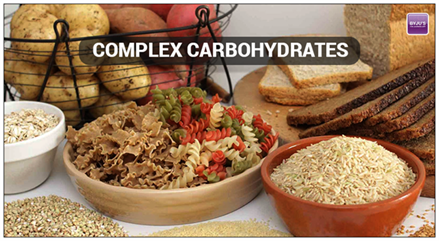What are Complex Carbohydrates?
Carbohydrates consist of three major components namely starch, fiber, and sugar. Sugar is a simple carbohydrate while Starch and Fiber are complex carbohydrates. The quality of nutrients is determined based on how much of these components are found in food.
Table of Content
Complex carbohydrates are built up of sugar molecules, strung together in long complex chains. Complex carbohydrates can be found in foods like beans, peas, vegetables, and whole grains.

Both complex and simple carbohydrates are converted into glucose in the body and consumed as energy. Glucose is used in the brain and cells of the body. The unused glucose is stored in the muscles and liver then glycogen and used later.
Examples of Complex Carbohydrates
- Beta-glucan, Lentinan
- Sizofiran
- Zymosan
- Cellulose
- Chitin
- Chitosan
- Dextrin/Dextran
- Fructose/Fructan
- Inulin
- Galactose/Galactan
- Glucose/Glucan (Glycogen)
- Hemicellulose
- Levan beta 2→6
- Lignin
- Mannan
- Pectin
- Starch (Amylopectin Amylose)
- Xanthan gum

Recommended Videos

Complex Carbohydrates Foods
- Carbohydrates are the main suppliers of energy to the body.
- Foods containing complex carbohydrates provide minerals, vitamins, and fiber that are essential for good health.
- Most of the carbohydrates come from complex carbohydrates and natural sugars, rather than processed sugars that do not have vitamins and minerals present in natural and complex carbohydrates.
- Refined sugars are also known as empty calories since they have very less nutritional value.
- Milk is the only animal-derived food containing a considerable quantity of carbohydrates. There are two groups of carbohydrates: simple and complicated. Complete grains, beans, and vegetables include foods elevated in “healthy” complicated carbohydrates.
- Foods rich in complex carbohydrates and dietary fiber should also be emphasized by parents and caregivers for kids over 2 years of age, but care must be taken that these foods do not fill up a baby before energy and nutrient demands are met.
The More Complex the Better!
The complex carbohydrates consist of more nutrients compared to simple carbs, since they contain more fiber and digest slowly. It also makes complex carbohydrates more filling which indicates that they are a better option to control weight. Fiber is essential since it promotes regularity in the bowel and controls cholesterol.
Complex carbohydrates, particularly when combined with protein and fat, are more probable to maintain your blood sugar steady.
Major sources of dietary fiber are as follows:
- Vegetables
- Nuts
- Fruits
- Whole grains
- Beans
Starch also exists in many of the same foods. Certain foods are considered to be more starch than fibrous in nature like potatoes.
The major high starch containing food are:
- Cereal
- Wheat bread
- Corn
- Oats
Complex carbohydrates make it easier to maintain body weight, and shield you against cardiovascular problems and type 2 diabetes in the future.
Frequently Asked Questions – FAQs
What are the complex carbohydrates?
Complex carbohydrates consist of sugar molecules in lengthy, complicated chains.
What are the 3 types of complex carbohydrates?
There are three elements of carbohydrates: fiber, starch and sugar. Fiber and starch are complex carbs, while sugar is a simple carbohydrate.
Are bananas complex carbohydrates?
Sometimes referred to as carbohydrates, such as the starch in bananas, they can be either easy or complicated. However, a ripe banana’s carbohydrates are better assimilated than potato starch, which makes this fruit especially interesting.
Why are complex carbohydrates important?
Complex carbohydrates often provide the body’s need for energy and other nutrients and fiber. It’s a better option. STARCH-Simple sugars break down in the body. In order to use it, the body must break down all sugar/starch into glucose.
Which is an example of complex carbohydrates?
Complex carbohydrates consist of sugar molecules in lengthy, complicated chains. In foods such as peas, beans, whole grains, and vegetables, complex carbohydrates are discovered.
What is the difference between complex and simple carbohydrates?
Complex carbohydrates are found in such foods as bread and pasta. Foods such as table sugar and syrups contain basic carbohydrates. Complex carbohydrates have longer sugar molecular chains than mere carbohydrates. These sugar molecules are converted by the body into glucose, which it uses for energy.
What are the 4 types of carbohydrates?
The saccharides are classified into four chemical groups: monosaccharides, disaccharides, oligosaccharides, polysaccharides and others. Sugars are commonly referred to as monosaccharides and disaccharides, the smallest (lower molecular weight) carbohydrates.
What are the five sources of carbohydrates?
Carbohydrates are present in a wide range of nutritious as well as toxic foods — bread, beans, milk, pasta , potatoes, cookies, noodles, soft drinks, candy, and cherry pie. They come in a number of ways as well. The most popular and plentiful types are sugars, starches, and fibres.

Comments